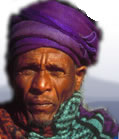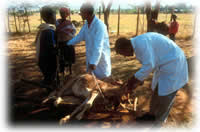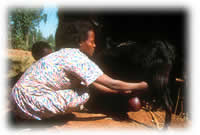 |
 |
||
 |
|||
|
RELATED THEMES agriculture development environment land OTHER LOCAL THEMES BACKGROUND |
livestock
Nowadays herding no longer offers a viable livelihood, owing to lack of grazing land on the farms and appropriation of the "wilderness" for government forestation schemes. Livestock numbers have been greatly reduced: "[In the past] my parents had 25 goats, 15 sheep, five cattle and seven donkeys. Now these have decreased to two donkeys, three cattle and five goats." (Ethiopia 6). One reason for the dwindling numbers is that animals die of starvation or disease: "The livestock have nothing to graze and spend the whole day lying on the barren land. They are dying of hunger and disease" (Ethiopia 11); another is that people have been forced to sell their livestock to buy food, fertiliser or other essential goods. Moreover, the remaining livestock is not reproducing well, and dairy animals produce less milk than in the past when there was plenty of grass: "Nowadays three cows do not give as much milk as one cow used to give in the old days" (Ethiopia 1). According to several narrators, livestock diseases, including ibett, gufta and anqettqitt, have increased. The provision of veterinary services seems to be fairly patchy; where these are exist, these are generally welcomed, although more than one narrator comments that they do not prevent the animals from dying of starvation. quotes about livestock
"One [disease] is called wotetie. It is called gitchit (literally, knocking against one another) when it is transmitted from one animal to another. At this time we tell the shepherds not to mix the sick ones with the healthy ones. The disease makes their hair fall out. They suffer from dysentery and they become skinny. We burn plants called qebericho and tinjut and make them inhale the smoke. The animals will be covered with cloth. Still some of them die." |
|
 In the past there was apparently plenty of grazing land. Land set aside after cultivation provided fodder, as did the "wilderness" areas where livestock could roam freely. Many people owned a considerable variety of livestock and, along with agriculture, herding was the mainstay of the local economy.
In the past there was apparently plenty of grazing land. Land set aside after cultivation provided fodder, as did the "wilderness" areas where livestock could roam freely. Many people owned a considerable variety of livestock and, along with agriculture, herding was the mainstay of the local economy.